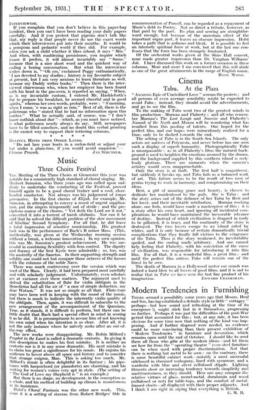Cinema
Tabu. At the Plaza
"AMAZING Epic of Uncivilized Love " scream the posters ; and all persons of even average sensibility might be expected to avoid Tabu ; instead, they should avoid the advertisements, and go to see the film. To the making of Tabu went two of the greatest minds in film production—Murnau and Flaherty ; and all who remem- ber Murnau's The Last Laugh and Sunrise and Flaherty's Nanook of the North and Moana will be wondering what has resulted from this pooling of talents. One hoped for the perfect film, and our hopes were miraculously realized for a time, only to be dashed towards the end. The setting of Tabu is in the South Sea Islands. The only actors are natives of Polynesia, and never before has one seen such a display of superb humanity. Photographically Tabu is unsurpassable : as in all Flaherty's films the natural back- ground is used to heighten the emotions aroused by the drama, and the background supplied by this southern island is reck- lessly glorious. There are moments when the camera's artistry would seem unapproachable. Only the story is at fault. The first half is magnificent, but suddenly it breaks up, and Tabu fails as a balanced work of art. This failure seems to be the result of two men of genius trying to work in harmony, and compromising on their ideas.
Reri, a girl of amazing grace and beauty, is chosen to dedicate her maidenhood to the gods. She is Tabu : and the story arises out of the defiance of her Tabu by Reri and her lover, and their inevitable retribution. Murnau working alone, one feels, would have made a masterpiece of this : it is a story after his own heart, and ignoring all incidental com- plications he would have maintained the inexorable advance of destiny. Instead of which civilization is dragged in (only to be pilloried, it is true), and the continuity of the story is destroyed. The two lovers escape to an island ruled by whites, and it is only because of certain dramatically trivial complications that they finally fall victims to the vengeance of the Tabu. Thus is the story weakened, its inevitability spoiled, and the ending made arbitrary. And one cannot help feeling that Flaherty, with his conviction of the curse of civilization, was responsible for introducing it into this film. For all that, it is a wonderful film, a great film ; and until the perfect film arrives Tabu will remain one of the finest to be seen.
The death of Murnau in a Hollywood motor car smash was indeed a hard blow to all lovers of good films, and it is sad to realize that in Tabu we have seen the last fine product of his


































 Previous page
Previous page